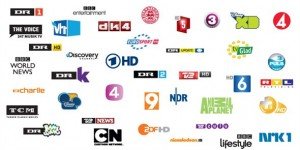TV channels after independence

When cable TV was introduced, the typical package therefore included the main German channels (ARD, ZDF, NDR, Sat1, RTL), the Swedish ones (SVT1 and SVT2) and the Norwegian one (NRK), and this is still frequently the case, I believe.
Something similar happens in most other countries. It’s generally the case that viewers can watch the main TV channels from neighbouring countries.
We would expect to see something similar in Scotland after independence.
Of course, before this can happen, Scotland will need to get its own TV channels. I reckon BBC1 Scotland, BBC2 Scotland and BBC Alba will become independent of the rUK BBC in 2016 and be renamed to something along the lines of SBC1, SBC2 and SBC Gàidhlig. At the same time, STV will probably continue more or less as before, except that its coverage will be extended to include all of Scotland. Channel 4 and Channel 5 are a bit trickier — they could either continue as before, or be made to set up Scottish subsidiaries.
The Scottish channels will surely do their best to broadcast what Scottish viewers want to watch, and this will include buying rUK programming (such as Eastenders, The X Factor, The Apprentice, and nature programmes). Sometimes they might want to create a Scottish version instead, such as a Scottish Big Brother.
What’s important to understand here is that the purchasing of programming is a commercial negotiation, and as such, it’s expensive to reveal your hand. In other words, if the Scottish Government guarantees that the SBC will broadcast Eastenders, the price is likely to double. We should therefore not expect to see the details of SBC programming to be fleshed out in details in advance.
Once these new channels have been created, it’s likely that many Scots (at least those with satellite or cable TV) will get the option to receive the rUK BBC channels, perhaps at a modest fee. What this means is that many households will get twice as many TV channels as they do now.
Broadcasting is one of those areas where independence will lead to change, but on the whole it’ll be a change for the better.
On a small side note to this one. In Northern Jutland, we can receive (or at least we could 2-3 years ago, I haven’t check lately) the BBC. BBC iPlayer is off limit (in Denmark) since you’re not on a UK IP-address. So apparently you can watch live BBC (in DK) without paying UK TV licence, but you can’t watch the off-air BBC productions, which are the ones UK residences don’t need to TV licence for.
RT @arcofprosperity: New blog post: TV channels after independence http://t.co/QnPsKy4xtQ #indyref